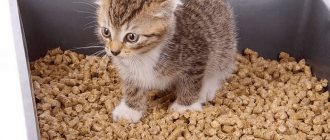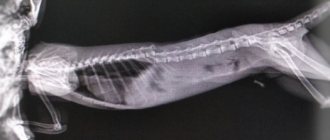“Mom, let's get the kitten!” Many parents hear a similar request and demand from their children. Instead of a cat, there may be a dog, a hamster, or less often a bird. But in any case, the meaning of the child’s request does not change: he wants an animal to appear in the house. It doesn't matter how many toys he has. Even if there are few of them and parents are trying to seduce their child with some fashionable new product from the gaming industry instead of Murka or Zhuchka. A little man often remains adamant about his idea of having a kitten.
Pressure from parents
Then the adult side resorts to pressure to force him to give up his desire to have a pet. As motivation, they usually cite the potential danger that cats and dogs pose to a child’s health - fleas, worms and “any kind of infection in general.” The forces in such a conflict are too unequal, and therefore children rarely manage to insist on their own.
It would seem that nothing terrible happened. The baby will try and forget. But nothing will threaten his health. And there will be no hassle with keeping an animal in the house. In fact, without knowing it, by refusing to get a cat or a bug, child-loving parents are harming the child’s health. And first of all, spiritually, that is, the psyche is so vulnerable at a young age.
Let's try to figure out why children at some stage - some at seven, others at ten, others at twelve - develop a desire for close communication with pets.
The desire to have a kitten is not just a whim
There is an opinion that this is simply a whim of modern children, fed up with entertainment, who want to get a “living toy”, and having achieved their goal, they quickly lose interest in it. However, practice shows that this is not the case at all. More often than not, a cat or dog that has taken up residence in an apartment overshadows even the favorite toys of far from spoiled children. And how kids are drawn to street Murkas and Bugs during walks, despite the strictest prohibitions of mothers and grandmothers! Consequently, they are driven not simply by the desire to have fun, but by some stronger internal impulse.
Religious philosophers explained this phenomenon in a completely different way. After birth, the child lives with a pure, sinless soul, not noticing the sinfulness of the world around him. When he grows up a little and this world begins to open up to him, his soul rebels. She longs for communication with creatures who are not characterized by malice, envy, meanness, and selfishness. For they are able to give the little man much-needed spiritual comfort and support. And then the child declares to his parents: “I want a cat!” or “Buy me a dog!”
I am pregnant. Should I be afraid of toxoplasmosis?
Toxoplasma gondii is a protozoan parasite that can seriously impair fetal development. The feces of cats with an active Toxoplasma infection contain this parasite. For a pregnant woman to become infected with toxoplasmosis from a cat, the following must happen:
- The cat must have an active infection. Cats can only become infected by eating raw meat and prey with this infection. An active infection may have no symptoms, but remember that it only lasts a few weeks and is then suppressed by the immune system.
- A pregnant woman's mouth should contain feces from a cat with an active infection.
This means that getting an infection from a cat is extremely unlikely if the cat lives indoors, does not go outside, and eats canned or dried cat food. To be completely safe, the US Food Safety Inspectorate suggests pregnant women follow one very simple rule: “Do not clean your cat's litter box yourself.” Remember that there are other ways to get toxoplasmosis (not from cats), as well as other infections that can harm your baby (and they have nothing to do with cats!).
Psychologists advise
Psychologists share a similar point of view. As James Serpell, who led animal ecology research at the University of Cambridge, points out, those who constantly interact closely with pets provide a kind of emotional support that is sometimes lacking even between members of the same family, not to mention single people. Moreover, our children often become such “lonely people,” since parents are so busy with things that they do not have time for their children. According to the scientist, this support can be considered real psychotherapy, which has a clear mechanism of action.
Interesting: How to determine the gender of a kitten - male or female: The most reliable methods
“Paradoxical as it may be ,” Serpell writes, “the muteness of murks and bugs is an advantage, not a disadvantage. Indeed, in the process of communication, it is important for a person not only what he hears, but also how he is listened to. So the fact that pets listen and seem to understand us, but don't ask questions or make judgments, may be their most endearing quality as companions."
All this is even more true for children. After all, adults often, without realizing it, with their angry reprimands, shouts, critical remarks - “How many times have you been told!..”, “You again!..”, “Don’t bother yourself with nonsense!” — they hurt the child’s soul and cause him stress. But our psyche is designed in such a way that a person cannot remain captive of negative emotions for a long time. And the child instinctively looks for a way out for them, for example, in crying. Meanwhile, communication with an animal would be much more useful in such cases. By petting his pet, no matter a cat or a dog, he receives psychological relief and support.
Check weighing
To ensure that kittens are getting enough food and are gaining weight well, you should weigh them daily in the first week of life and at least twice a week for the first month - we recommend keeping a weight gain diary. It is convenient to use electronic kitchen scales for weighing.
The weekly increase should be about 100 grams. By the age of two weeks, healthy kittens should certainly double their original weight. Contact a professional if you suspect your kittens are not gaining weight well. Signs of malnutrition can also include constant squeaking, restlessness, and poor sleep.
Getting a pet is the right decision
The very presence of an animal in the house already creates an atmosphere of psychological comfort for the child , since they evoke positive emotions in him. Such emotions stimulate the production of “pleasure hormones,” which, in turn, create favorable conditions for brain function. An interesting experiment in this regard was carried out in America. In the study, 36 children aged 9 to 16 years old who owned dogs read a complex text aloud once in the presence of their Bugs, and a second time without them. In the first case, their blood pressure and pulse rate were significantly lower. This suggests that their dogs are an anti-stress factor for children.
However, the presence of a cat or dog in the house can play an important role in correcting the psyche and behavior of children with deviations from the norm. In families with one child, parents often complain about his increased excitability, capriciousness, and sometimes hysterical breakdowns. The standard advice from doctors in such cases is short: there is no need to spoil the child.
In fact, this is not the reason at all. Even if he is not pampered, he is still constantly the object of increased attention from family members. The child’s words and actions are always visible and therefore subject to meticulous analysis, although the adults themselves do not think about it. And it doesn’t matter whether they admire the baby or, on the contrary, scold him. Equally bad, both such “tests of glory” can be overwhelming for a still fragile psyche and lead to nervous disorders.
Once you get a cat or dog, part of the family's attention inevitably shifts to the pet, even if the parents don't realize it. It will, as it were, obscure the child, drawing away excess attention from adults. And the positive effect of the presence of Zhuchka or Murka will not take long to appear. In addition, they will be excellent anti-stress companions for the baby himself.
Age ratio of kittens up to 12 months
Kittens grow up very quickly.
The most crucial moment occurs at the age of 1-3 months. The kitten adapts to the environment and switches from milk feeding to regular food. From the 4th month to a year, a more stable period. The baby grows, gains weight, discovers the world and puberty occurs. It is difficult to find a specific figure to estimate how many years one month of a kitten’s life will be. Our table allows you to most accurately convert the age of a kitten into human years, taking into account the physiology of development.
| Kitten age | Person's age |
| 1 month | 1.5 years |
| 2 months | 2 years |
| 3 months | 3.5 years |
| 4 months | 5 years |
| 5 months | 6 years |
| 6 months | 7 years |
| 7 months | 9 years |
| 8 months | 10 years |
| 9 months | 11 years |
| 10 months | 12 years |
| 11 months | 14 years |
| 12 months | 16 years |
The positive impact of animals on a child's health
But pets can provide children with more than just psychotherapeutic assistance. Currently, a new direction of energy-informational treatment is rapidly developing in medicine. In this case, electromagnetic waves of extremely high frequency and ultra-low intensity are used, causing a positive resonance in the human body.
As a source of corrective radiation, special equipment and... the hands of bioenergy therapists, as they are now called, psychics, are used. But both the cat and the dog, sitting on the lap or near the owner, also irradiate him with their electromagnetic waves. Therefore, it is possible that their frequencies can resonate with human ones and thus eliminate energy disruptions. At the VII International Conference on Problems of Human-Animal Interaction in Geneva, which was attended by more than 600 scientists and medical practitioners, many cases were cited in which constant communication with animals, and consequently their inevitable energetic impact, healed people. Here's one of them.
Interesting:











